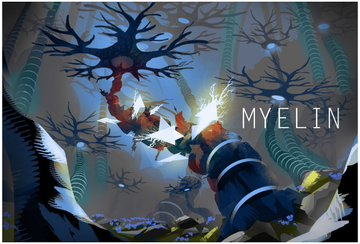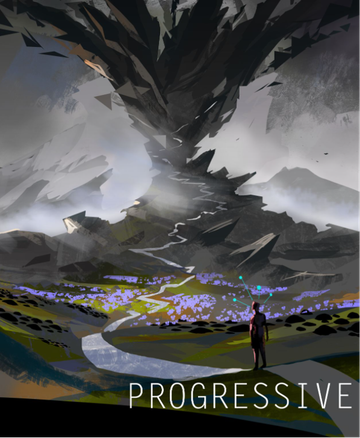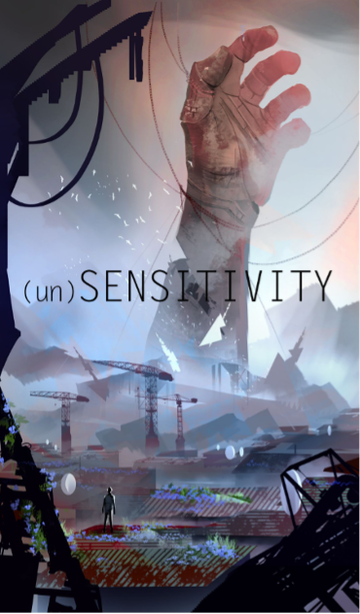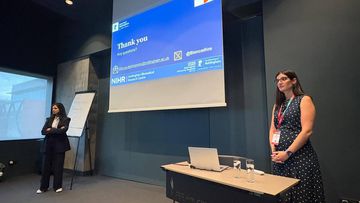Concept art helping people connect with the reality of MS
NewsThe theme for World MS Day 2020-2022 is ‘connections', with an associated campaign focused on building community connection, self-connection and connections to quality care.
This World MS Day, we interviewed Italian artist Consuelo Pecchenino who explains why she made her series of paintings about experiencing MS, and what they mean to her. As she speaks, she touches on all three elements of connection, highlighting both the importance of connectivity, and the role that art can play in that connection.
Connection to quality care
When clinicians connect with those living with MS in a meaningful way and understand their experiences of the condition in day to day life, it creates compassion and enhances a partnership approach to treatment and management decisions.
However, understanding the reality of living with MS and the way the different symptoms impact each individual can be really challenging - and those living with MS themselves can find it difficult to articulate.

The title image 'Myelin' in Consuelo's series 'Multiple Scenery' accessible at https://www.multiplescenery.com/
The importance of a 'good diagnosis' is well known, yet the number of people with MS who experience this is far fewer than those diagnosed. Shift.MS has begun to explore the trauma that people with MS feel as a result of their diagnosis, and there is some thought around whether post-traumatic stress resulting from difficult diagnostic experiences may contribute to poorer outcomes in those with MS.
Professor of Neurology Gavin Giovannoni blogged on the subject last year, saying:
‘When asked, a large number of pwMS tell me the worst part of MS is being told you have MS. In an Italian study a quarter of pwMS have symptoms of PTSD and more than 1 in 20 have a confirmed diagnosis of PTSD.’
As a successful digital landscape artist, Consuelo chose to create a series of pictures entitled 'Multiple Scenario: trip into the Multiple Sclerosis world' to express her experiences of MS through her art, spurred in part through her own diagnosis.
'My diagnosis was 'You have MS.' That was it. I didn't really know what it meant. I thought it meant that I was going to die. I went home and Googled. That really didn't help 'I wish I had these illustrations to help me when I was first diagnosed.'
Whilst she has developed the images to help people with MS and their friends and family to better understand the realities of living with MS, seeing MS from a new, sensory perspective can also help healthcare professionals to understand their patients and their experiences in a new light. This in turn can affect the way they practice medicine.
A MasterClass delegate
Community connection
After her diagnosis, Consuelo found it hard to engage with the information available, as nothing seemed to help her process or understand her MS.
'When I was diagnosed, there were medical explanations, there were blogs, and I needed something else. I had a wish to create something new around MS - MS is not a sentence.'
Consuelo explains that the invisibility of so many symptoms she experiences, like vertigo, Lhermette's sign and fatigue, made them especially difficult to explain to those around her, including her family. The symptoms themselves and the emotions they brought up were both hard for her to share verbally. She chose to use metaphorical landscapes to depict aspects of MS that she has found particularly hard to communicate, using the illustrations to share the feelings behind some of those more nebulous symptoms.
'Most of MS's daily symptoms are hidden, invisible to the eye. I needed to find a way to make my invisible symptoms visible because if something is visible, I think it's easier to understand.'
She shares her perception of pain and the emotional impact of MS through art to help others understand the condition better. Consuelo found that there was a lack of hope in the available information and narratives around MS.
She wanted her paintings to be both an honest exploration of these symptoms to communicate with others around her, but also an encouragement to those who do live with MS. She explains that these paintings are also for those with MS, to say that she sees their strength in living with these experiences every day, and that in sharing that recognition, the paintings can be a message of hope, too.
'I want to share these paintings more widely, but people don't want to talk about illness, it's not so shareable as something happy, or a meme…but there is hope. Hope is not the hope to not have MS, which is what I think many people with MS have; it is hope that I can find the sunshine in the difficulty of the journey. We need to look at what's behind the catastrophe to see the flowers. I try to show this in the paintings'
The painting 'Progressive' particularly encapsulates this message combining the difficulty and the fear, with strength in adversity, and hope. Her strength of emotion was very clear as she described the painting which depicts a terrifying uphill journey across barren, rocky terrain to an inverted mountain, 'representing the difficulty of the path, like an overhanging route'. But, there are meadows with flowers blossoming in them to either side of the path providing her message of hope and of beauty in extreme adversity.

Reproduced with kind permission from the artist, Consuelo Pecchenino
Self-connection
Consuelo gave a TedX Italy talk in April last year entitled 'Ridisegnare sé stessi'. Talking about her art and her MS, she shares the challenge of losing her dominant hand during a relapse and how, whilst working to recover her hands' functionality through therapy, she overcame the challenge by learning to use her other hand in order to retain her career as an artist.
'The painting 'Unsensitivity' is particularly about this. With MS, I lose my dominant hand; I lose the feeling in it and I can't grip. I rely on my hands - I'm a painter and I have clients. After a relapse I lost the use of my hand completely for a while.
I had to learn to use my other hand, and my brain had to learn new pathways to be able to use my other hand to continue my art. The painting, 'Insensitivity' shows this, how I experienced this.'

Reproduced with kind permission from the artist, Consuelo Pecchenino
The TedX talk is available online in Italian and whilst it is not yet available translated into other languages, Consuelo is hopeful that there will be a version available with English subtitles in the near future.
In addition to 'Progressive' and '(Un)sensitivity; her paintings currently examine her feelings about Myelin damage, having an MRI scan, and living with relapsing remitting MS, as well as her experiences of fatigue, l'Hermette's sign, Uhthoff's phenomenon, and vertigo.
She has other symptoms in mind to paint as an extension to the series, but describes the barriers to this. There is the challenge of fitting this personal project into her wider paid work as an artist, but the bigger barrier is the daunting knowledge that she will have to really engage with the impact of these symptoms on her life to render them truthfully.
'It is hard to paint these symptoms because it's a trauma - to paint these requires opening a closet inside me and it was really painful. It was also a journey and it was really cathartic to go through that journey. But it was very, very hard.'
Consuelo is keen to share these paintings widely to help others in the way she feels best able.
'I was so frightened to do this, but I feel that my art, this is the thing that I can do to help people with MS, to share what it can be like and for that to make a difference.'
For more information on the impact of diagnosis on people with MS, and the impact of hidden symptoms of people with MS' quality of life, Head of Nursing Ruth Stross has summarised some key thoughts.
Ruth Stross | Impact of diagnosis
Acknowledgements
We are truly grateful to Consuelo for allowing us to reproduce two of her paintings in this article, and for her honesty in sharing her experiences and her story for this piece.
All of Consuelo's MS series can be found on her LinkedIn page currently, and her new bespoke website for the series can be found at https://www.multiplescenery.com/
#MSConnections
Related articles
Encouraging excellence, developing leaders, inspiring change
MS Academy was established in 2016 and in that time has accomplished a huge amount with exciting feedback demonstrating delegates feel inspired and energised along their personal and service development journeys. The various different levels of specialist MS training we offer are dedicated to case-based learning and practical application of cutting edge research.


